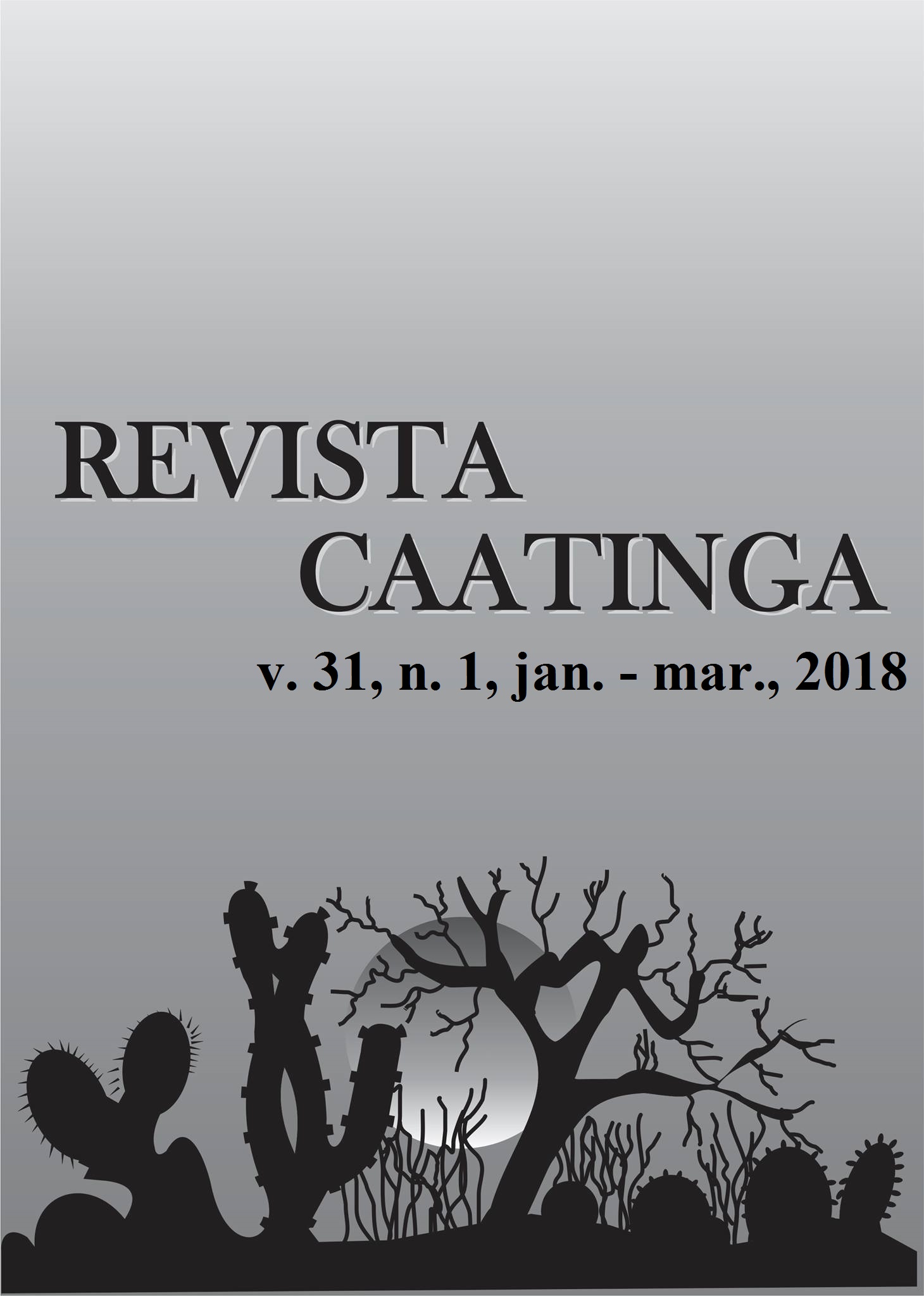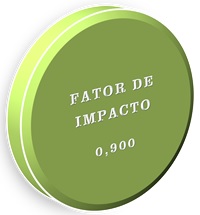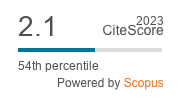TOLERANCE OF F2 POPULATIONS OF COWPEA TO WATER DEFICIT
DOI:
https://doi.org/10.1590/1983-21252018v31n106rcKeywords:
Vigna unguiculata. Abiotic stress. Grain production.Abstract
Water deficit affects plant development and the overcoming of its effects depends on the genotype, duration of stress, severity of damage and development stage of the plant at water stress. Cowpea is considered tolerant to water deficit, however, studies have shown that its yield can be reduced under this condition. Thus, the objective of this work was to evaluate the effect of water deficit on F2 populations of cowpea and select tolerant genotypes. Thirty F2 populations of cowpea and their parents (BRS-Paraguaçu, Pingo-de-Ouro-1-2, BRS-Xiquexique, CNCx-698-128G, Santo-Inácio and MNC99-510F-16-1) were evaluated in two experiments, one under induced water deficit and other under full irrigation, in the experimental field of the Embrapa Mid-North, in Teresina, State of Piauí, Brazil. A triple lattice incomplete block experiment design was used, with three replications. The experimental plots consisted of six 2-m rows, with spacing of 1.0 m between rows and 0.50 m between plants. The grain production was evaluated and its decrease related to the relative production and tolerance to stress was calculated. The grain production of the genotypes had an average decrease of 29.83% under water deficit. The genotypes from the crosses BRS-Paraguaçu x CNCx-698-128G, BRS-Xiquexique x Pingo-de-Ouro-1-2, CNCx-698-128G x BRS-Xiquexique, CNCx-698-128G x MNC99-510F-16-1, Santo-Inácio x BRS-Xiquexique and MNC99-510F-16-1 x BRS-Paraguaçu had high production and high tolerance to water deficit.Downloads
References
ANYIA, A. O.; HERZOG, H. Water-use efficiency, leaf area and leaf gas exchange of cowpeas under mid-season drought. European Journal of Agronomy, Amsterdam, v. 20, n. 4, p. 327-339, 2004.
BASTOS, E. A. et al. Identification of cowpea genotypes for drought tolerance. Revista Ciência Agronômica, Fortaleza, v. 42, n. 1, p. 100-107, 2011.
BEZERRA, F. M. L. et al. Feijão-caupi e déficit hídrico em suas fases fenológicas. Revista Ciência Agronômica, Fortaleza, v. 34, n. 1, p. 13-18, 2003.
CARVALHO, L. C. B. et al. Phenotypic correlations between combining abilities of F2 cowpea populations. Crop Breeding and Applied Biotechnology, Viçosa, v. 12, n. 3, p. 211-214, 2012.
CRUZ, C. D. Genes: a software package for analysis in experimental statistics and quantitative genetics. Acta Scientiarum Agronomy, Maringá, v. 35, n. 3, p. 271-276, 2013.
FATOKUN, C. et al. Enhancing drought tolerance in cowpea. African Crop Science Conference Proceedings, Kampala, v. 9, n. 1, p. 531-536, 2009.
FREIRE FILHO, F. R. et al. Melhoramento genético. In: FREIRE FILHO, F. R.; LIMA, J. A. A.; RIBEIRO, V. Q. (Eds.). Feijão-caupi: Avanços tecnológicos. Brasília: Embrapa Informação Tecnológica. 2005. p. 27-92.
FRITSCHE-NETO, R.; BORÉM, A. Melhoramento de plantas para condições de estresses abióticos. Viçosa, MG: UFV, 2011. 240 p.
GENUCHTEN, M. T. A closed-form equation for predicting hydraulic conductivity of unsaturated soils. Soil Science Society of American Journal, Madison, v. 44, n. 5, p. 892-898, 1980.
GRIFFING, B. Concept of general and specific ability in relation to diallel crossing systems. Australian Journal of Biological Sciences, Melbourne, v. 9, n. 4, p. 462-493, 1956.
LARCHER, W. Ecofisiologia vegetal. Tradução de PRADO, C. H. B. A. e FRANCO. A. C. São Carlos, SP: Rima, 2000. 531 p.
NASCIMENTO, S. P. et al. Tolerância ao déficit hídrico em genótipos de feijão-caupi. Revista Brasileira de Engenharia Agrícola e Ambiental, Campina Grande, v. 15, n. 8, p. 853-860, 2011.
PIMENTEL-GOMES, F. P. Curso de estatística experimental. 15. ed. Piracicaba, SP: Esalq, 2009. 477 p.
RAMALHO, M. A. P.; FERREIRA D. F.; OLIVEIRA, A. C. Experimentação em genética e melhoramento de plantas. Lavras, MG: UFLA, 2005. 300 p.
SAS INSTITUTE. SAS-STAT Software: Changes and Enhancements Through Release 6.12. SAS Institute, 1997.
SHINOZAKI, K.; YAMAGUCHI-SHINOZAKI, K. Gene networks involved in drought stress response and tolerance. Journal of Experimental Botany, Oxford, v. 58, n. 2, p. 221-227, 2007.
SINGH, B. B.; MATSUI, T.; Cowpea varieties for drought tolerance. In: FATOKUN, C. A. et al. (Eds.). Challenges and Opportunities for Enhancing Sustainable Cowpea Production. Ibadan: International Institute of Tropical Agriculture, 2002, p. 287-300.
TALAMÉ, V. et al. Barley transcript profiles under dehydration shock and drought stress treatments: a comparative analysis. Journal of Experimental Botany, Oxford, v. 58, n. 2, p. 229-240, 2006.
ZHOU, J. et al. Global genome expression analysis of rice in response to drought and high salinity stresses in shoot, Xag leaf, and panicle. Plant Molecular Biology, Dordrecht, v. 63, n. 5, p. 591-608, 2007.
Downloads
Published
Issue
Section
License
Os Autores que publicam na Revista Caatinga concordam com os seguintes termos:
a) Os Autores mantêm os direitos autorais e concedem à revista o direito de primeira publicação, com o trabalho simultaneamente licenciado sob a Licença Creative Commons do tipo atribuição CC-BY, para todo o conteúdo do periódico, exceto onde estiver identificado, que permite o compartilhamento do trabalho com reconhecimento da autoria e publicação inicial nesta revista, sem fins comerciais.
b) Os Autores têm autorização para distribuição não-exclusiva da versão do trabalho publicada nesta revista (ex.: publicar em repositório institucional ou como capítulo de livro), com reconhecimento de autoria e publicação inicial nesta revista.
c) Os Autores têm permissão e são estimulados a publicar e distribuir seu trabalho online (ex.: em repositórios institucionais ou na sua página pessoal) a qualquer ponto antes ou durante o processo editorial, já que isso pode gerar alterações produtivas, bem como aumentar o impacto e a citação do trabalho publicado (Veja O Efeito do Acesso Livre).







